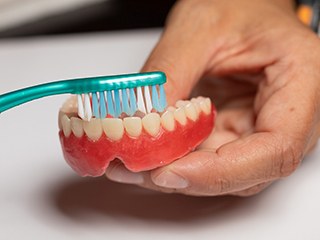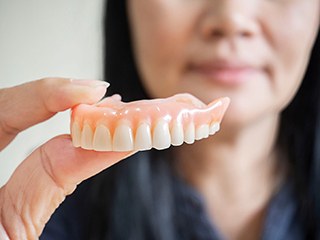Dentures – McComb, OH
A Comfortable, Custom-Made Solution to Tooth Loss

Once you’ve lost teeth, your remaining teeth can shift, and you could become susceptible to jawbone loss. Your facial muscles may sag, making you look much older, and your confidence often suffers as well. At McComb Family Dental, we believe that just because you’re missing teeth doesn’t mean you have to say goodbye to good oral health or a fabulous smile. We can rebuild your smile with dentures in McComb. This comfortable, custom-made solution to tooth loss can improve functionality and boost your self-esteem. To learn more, we invite you to give us a call!
Are Dentures Right for Me?

Most patients who have lost some or all of their teeth would make great candidates for dentures. You may have to undergo some preparatory work beforehand, such as tooth extractions or gum disease therapy, but the majority of patients with missing teeth could benefit from traditional dentures.
Good candidates for implant-retained dentures, however, should also have a jawbone that is strong enough to support dental implants. If that is not the case, you may need to receive a bone grafting procedure before implants can be placed.
Types of Dentures

Whether you’ve lost just a few pearly whites or a whole mouthful, our dentists can offer a solution. Depending on your specific oral health needs, they may recommend one of the following types of dentures:
Partial Dentures
A partial consists of a gum-colored acrylic base, a metal framework that attaches to your remaining teeth, and prosthetic teeth that are strategically placed to fill the gaps in your grin. These teeth are personalized to resemble the shape, size, and color of your natural teeth.
Full Dentures
With a full denture, an entire row of artificial teeth sits atop a pink base that rests snugly on your gums. Natural suction should be enough to keep it firmly in place, but you could always buy some denture adhesive for added security.
Implant-Retained Dentures
For an even more secure solution, we may suggest an implant-retained denture. Four to six dental implants can be placed at precise angles and locations throughout your jawbone. Once these titanium posts have integrated with the bone, then a full or partial denture can be placed on top. Implant-retained dentures are generally more stable and longer-lasting than their traditional counterparts.
How Dentures Are Made

There are several steps to creating dentures that are just right for your mouth. We can go over the process with you during your first consultation, and we can explain why each step is necessary for creating a grin that you can be proud of. If you have any questions about how dentures are made, don’t hesitate to reach out. In the meantime, here are the basics when it comes to creating full and partial dentures.
What Are Dentures Made Of?

Each denture includes a base and a number of artificial teeth. Both of these key components are made to look as natural as possible.
Normally the base of your dentures will be made out of acrylic. Alternate materials that are sometimes used include porcelain, resin, metal, or nylon. The base will be designed in a way to help it blend in with your gums; this will make it less likely that casual observers will notice that you’re wearing a dental prosthesis. If you get a full denture, the base will use suction to stay attached to your gums. With partial dentures, clasps are used to keep the base anchored to your remaining natural teeth.
As for the artificial teeth, you can generally expect them to be made from resin. Note that for partial dentures, the number of artificial teeth used can vary depending on how many teeth need to be replaced.
The Denture Creation Process

At the beginning of the process, our team will measure your jaw and capture impressions of your smile. We’ll then send a model of your mouth to a dental laboratory, where lab technicians will create your prosthesis by following these steps:
- A wax version of the gumline is made, and an appropriate number of artificial teeth are set into it. The wax base will be shaped to look like your actual gums.
- The wax dentures are sent back to our office so that we can see how they fit. If you’re happy with the results, the wax dentures will be sent back to the laboratory to continue the process.
- Boiling water is used to remove the wax so that it can be replaced with acrylic. This step requires a layer of plaster that helps the dentures keep their shape.
- Once the plaster and any unnecessary acrylic have been removed, your dentures are polished. They are then returned to our office for the final fitting and adjustments.
Adjusting to Your New Dentures

Your mouth might be sore when you first get new dentures, but that doesn’t mean anything is wrong with the prosthesis; your mouth simply needs time to adjust. You can get used to your dentures faster by:
- Eating foods that don’t require much chewing.
- Reading aloud and repeating any words you have trouble with.
Benefits of Dentures
Here are just a few of the many reasons to rebuild your smile with dentures:
- Regain your ability to bite, chew, talk, and smile
- Eat all of your favorite foods again
- Boost your confidence and overall appearance
- Improve your oral and general health
- Enjoy a long-lasting solution to partial or full tooth loss
Caring for Your Dentures
Even though dentures are cavity-proof, you’ll still need to sanitize them every day. Otherwise, bacteria and plaque could accumulate on them, increasing your risk of oral health problems like gum disease, sores, and cavities in remaining teeth. Here are some helpful tips for taking care of your dentures:
- After every meal or snack, take out your denture and rinse it off to prevent food debris from lingering and attracting harmful bacteria.
- If you have a partial, make sure to still brush and floss your natural teeth every day.
- Use a soft-bristled toothbrush and a denture cleanser to brush your dentures daily.
- When you’re not wearing your dentures, such as overnight, soak them in a glass of room-temperature (never hot) water or a denture cleaning solution to keep them from drying out and losing their shape.
Understanding the Cost of Dentures

Since every smile is unique, the cost of dentures in McComb can vary significantly from patient to patient. At your first appointment with our team, we’ll go over the factors that influence the overall price and will explain what you can expect to pay for your treatment. Our goal is to make sure you have a solid understanding of not only what your estimated cost will be, but what your future denture will look and feel like.
Factors that Affect the Cost of Dentures

When calculating the cost of your dentures in McComb, it’s important to remember that multiple factors can affect the overall price. Some of those include:
- Preliminary treatments needed before getting dentures (i.e., tooth extractions, gum disease therapy, etc.)
- Number of teeth you’re missing
- Materials your replacement teeth will be made of (i.e., porcelain or acrylic)
- Type of acrylic used for the base (i.e., the part that’s dyed to match the color of the gum tissue)
Patients on a budget may be tempted to get a cheaper denture. However, that’s not necessarily the ideal option. Just because it’s more affordable doesn’t mean it’s worth having! A cheaper oral appliance is more likely to break easily and will require a replacement much sooner than anticipated. It’s a good idea to invest in something that’ll last a lifetime, especially if it will be getting used every day.
Are Implant Dentures More Expensive?

Yes, but there’s a very good reason for that. Implant dentures require oral surgery and the placement of multiple dental implants, which is why they’re a more expensive treatment. Their unique placement makes them far more reliable for day-to-day use because they won’t shift out of place. In addition, they help stimulate the jawbone and will provide you with increased biting strength and longevity. Another benefit is that they won’t need to be replaced nearly as often as you would traditional dentures.
Does Dental Insurance Cover Dentures?

You’ll be happy to know that dental insurance does typically offer coverage for dentures since they’re considered a major procedure. In many cases, around 50% of the overall cost is covered! Of course, every policy is unique, meaning the exact percentage can vary based on your plan. Before committing to anything, make sure you confirm the details of your coverage with an insurance provider to ensure you know exactly what to expect. If needed, our team is more than happy to help with this process!
Other Options for Making Dentures Affordable

Don’t have dental insurance? That’s okay! At McComb Family Dental, we offer third-party financing through CareCredit to help make the cost of your care stay within your budget. With this option, you can split up the overall price of your dentures into smaller monthly installments. Best of all, most of these payment plans come with little-to-no interest attached, meaning you can save even more money!
Dentures Aftercare

Dentures are able to completely transform your smile! Not only do they improve your appearance, but they allow you to chew and speak clearly. However, even if you don’t have any remaining natural teeth, you should still have checkups. It is your dentist’s job to continue monitoring your gum tissue and any existing teeth that you have. They will also be on the lookout for abnormalities that could indicate an issue, like oral cancer. When you have dentures, it is difficult to notice these changes happening on your own. Early detection from your dentist is key!
Remove After Eating

After eating, remove and rinse your dentures. This helps to prevent the buildup of food debris and plaque on your prosthesis. When rinsing your dentures, make sure the water isn’t too hot. High temperatures can cause the denture material to warp, meaning that they will no longer fit you properly.
Clean Your Restoration

Take your dentures out to clean them. Using a soft-bristled toothbrush and a small amount of clear, unscented hand soap, mild dish soap, or a denture cleanser, gently brush your dentures. Don’t use regular toothpaste, as dentures aren’t made to stand up to abrasive products. If you aren’t going to be wearing dentures again right away, put them in a container of water or denture-cleansing solution so they don’t dry out and lose their shape. Remember to rinse your dentures thoroughly before putting them back in your mouth. The cleaning materials used are not intended to be used in the mouth.
Keep Your Dentures Safe

When you clean your dentures, place a towel underneath them just in case you accidentally drop them. This will reduce the probability of your dentures becoming damaged. You should keep your dentures out of reach of small children and pets.
Remove When You Sleep

Take your dentures out at night when you go to bed. Wearing them restricts the circulation in your gums and can lead to soft-tissue irritation. Sleeping with dentures has been associated with a higher risk of pneumonia as well as higher levels of gum and tongue plaque. Overnight, keep your dentures in water or a denture-soaking solution so they don’t lose their shape.
Notice Changes

Keep an eye out for changes so you can address them with your dentist. This includes mouth sores, gum irritation, or signs of infection. If your dentures become damaged, give us a call. Don’t try to repair them on your own as you might accidentally damage them further. If you notice shifting, clicking, or other signs that your dentures aren’t fitting properly, this is something you should bring up with us. Your dentures may need to be relined or replaced.
Dentures FAQs
Can I Sleep with My Dentures?
After you first receive your dentures, you’ll probably be instructed to wear them continuously for twenty-four hours, including when you sleep. After this period, dentists generally recommend removing them before going to bed. This is because wearing dentures limits circulation in your gums and taking them off for eight hours gives your mouth time to rest and clean itself. Leaving your dentures in for extended periods can lead to erosion of the gums and the jawbone while also creating a dark, moist space where bacteria can rapidly multiply. This accumulation of germs may increase a patient’s risk of developing pneumonia. Wearing dentures for too long is also associated with issues like poor oral hygiene and high levels of plaque on the gums and tongue.
Which Type of Denture Is Right for Me?
Partial dentures, full dentures, and implant dentures can all be great ways to replace lost teeth, but they each have different requirements. Tooth loss can be caused by oral infections, injuries, bone loss, or malnutrition, but which denture is best depends on the severity of your case. Partial dentures are designed for people who still have most of their teeth, and full dentures are recommended for those who have lost all of their teeth or have no remaining teeth that can be saved. While traditional dentures are held in place by suction, adhesive, or a combination of both, implant dentures are secured with titanium posts placed directly into the jawbone, creating a sturdier hold. Implant dentures require patients to have sufficient jawbone density, which may be achieved by some patients with a bone graft.
Is It Hard to Talk with Dentures?
When you first start wearing dentures, you can expect to have to get used to speaking while wearing them. While the time it takes to begin speaking comfortably and normally again can vary from person to person, getting more practice is a great way to make the learning process easier. You may experience issues like lisping or difficulty forming certain sounds, but this will fade as you get used to wearing dentures. A great way to get used to speaking with your dentures sooner is to read a favorite book out loud while repeating any words that you have trouble with. You may also try speaking slowly at first so you can more easily learn the precise oral movements needed. If your dentures tend to slide during speech, try biting down and swallowing before you speak to guide the appliance into their proper position. Some patients find that speaking is easier if they wear denture adhesive.
Will Dentures Change the Shape of My Face?
Tooth loss can cause facial muscles to sag, leaving your face with a sunken appearance. Since dentures take the place of lost teeth, wearing them will help support these facial muscles so you can enjoy a more youthful visage. However, dentures that don’t fit properly may not give your face the right support, so each set must be designed to fit the patient’s mouth precisely. You’ll also need to have your appliance refitted or replaced eventually due to the changing shape of your mouth.



 Request More Details
Request More Details